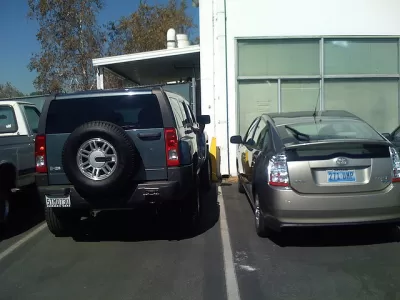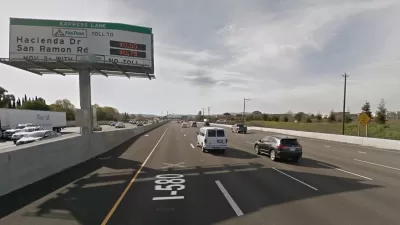A Hummer weighs 2.6 times more than a Prius C, so it must contribute that much more to road wear, right? Actually, that's wrong, not even close. To understand the main cause of road wear, one must look at heavy, not light trucks.

A "Hummer tips the scales at about 6,500 pounds with a V8 engine, a pint-sized Prius c hybrid checks in at 2,500 pounds," according to OReGO communications. "It might surprise you that each contributes about the same wear and tear to our roads and bridges."
No matter how tricked out your light-duty car, pickup truck or passenger van may be, there is no significant difference in the impact these vehicles have on a typical highway. [Italics mine]
The real damage comes not from Hummers but from heavy trucks. "Because of the heavy payloads they carry, an 18-wheeler weighing 80,000 pounds causes the same amount of road damage as 9,600 passenger vehicles."
In other words, if you feel SUVs should pay more in road taxes due to the damage they cause roads compared to lighter vehicles, the facts don't hold up.
If, on the other hand, you feel they should pay more in road taxes due to their emissions, you have a point. However, gas taxes, or Oregon's new road usage charge, will not be used to mitigate climate change like California's carbon charge on fuel does. Both will be used to pay for road maintenance.
What all cars, particularly lighter ones, need though, are good roads.
That’s why OReGO exists: to create an equitable transportation funding solution that charges passenger and light-duty commercial vehicles the same per-mile use rate—because they all cause about the same wear and tear to our roadways.
However, if Oregon wanted, they could charge a higher fee for vehicles that emit more emissions per mile driven, as was posted earlier.
As for ensuring that heavy trucks pay proportionately higher road maintenance costs, ODOT's Motor Carrier Transportation Division already charges "all commercial trucks and buses weighing more than 26,000 pounds" a weight-mile tax [PDF].
For more information on the costs to society, including and above road wear, caused by heavy trucks, see Joe Cortright's article in Streetsblog based on a March 30 CBO Working Paper, "Pricing Freight Transport to Account for External Costs."
FULL STORY: Splitting the check to help fund our roads

Planetizen Federal Action Tracker
A weekly monitor of how Trump’s orders and actions are impacting planners and planning in America.

Maui's Vacation Rental Debate Turns Ugly
Verbal attacks, misinformation campaigns and fistfights plague a high-stakes debate to convert thousands of vacation rentals into long-term housing.

San Francisco Suspends Traffic Calming Amidst Record Deaths
Citing “a challenging fiscal landscape,” the city will cease the program on the heels of 42 traffic deaths, including 24 pedestrians.

Defunct Pittsburgh Power Plant to Become Residential Tower
A decommissioned steam heat plant will be redeveloped into almost 100 affordable housing units.

Trump Prompts Restructuring of Transportation Research Board in “Unprecedented Overreach”
The TRB has eliminated more than half of its committees including those focused on climate, equity, and cities.

Amtrak Rolls Out New Orleans to Alabama “Mardi Gras” Train
The new service will operate morning and evening departures between Mobile and New Orleans.
Urban Design for Planners 1: Software Tools
This six-course series explores essential urban design concepts using open source software and equips planners with the tools they need to participate fully in the urban design process.
Planning for Universal Design
Learn the tools for implementing Universal Design in planning regulations.
Heyer Gruel & Associates PA
JM Goldson LLC
Custer County Colorado
City of Camden Redevelopment Agency
City of Astoria
Transportation Research & Education Center (TREC) at Portland State University
Jefferson Parish Government
Camden Redevelopment Agency
City of Claremont




























